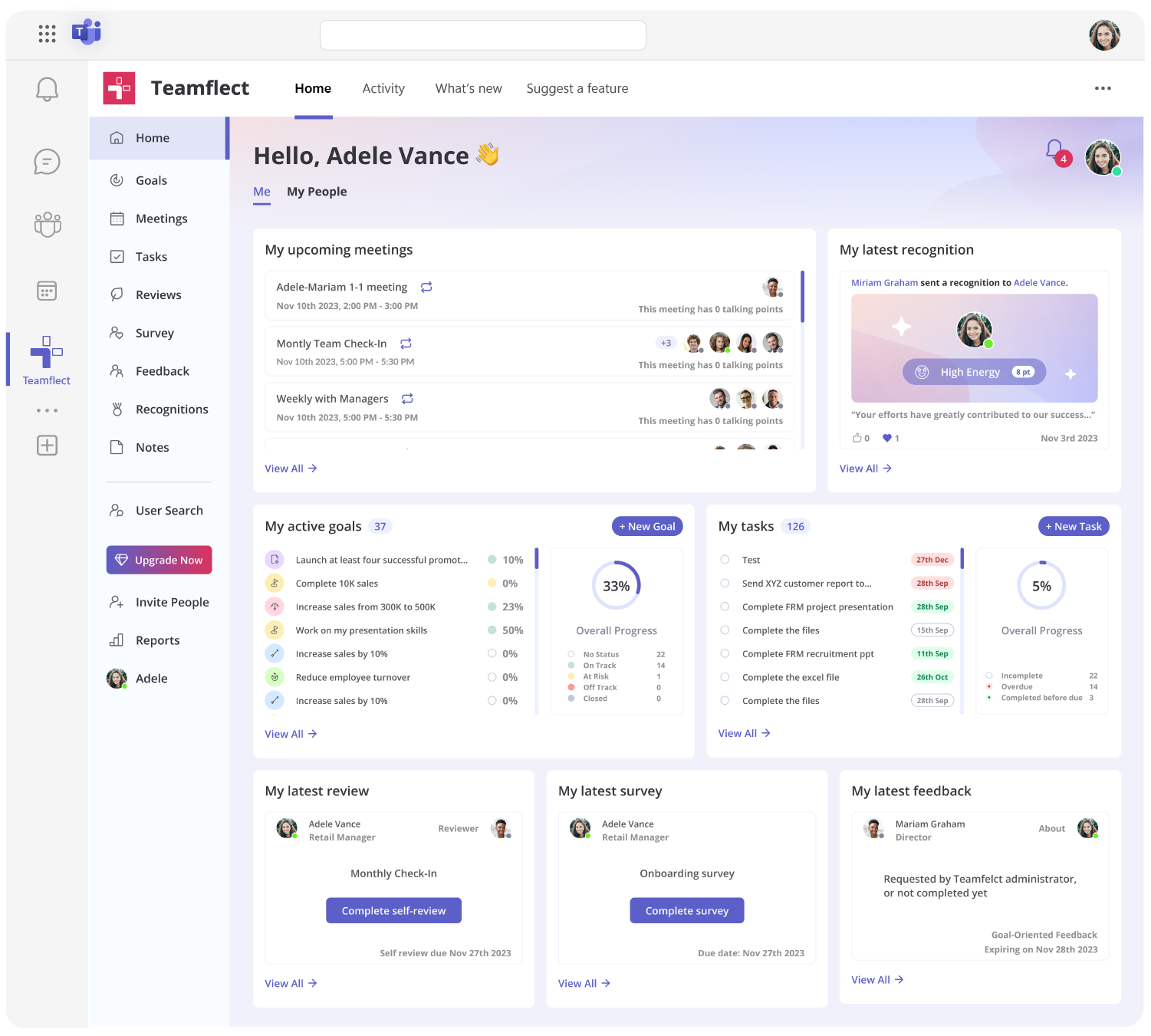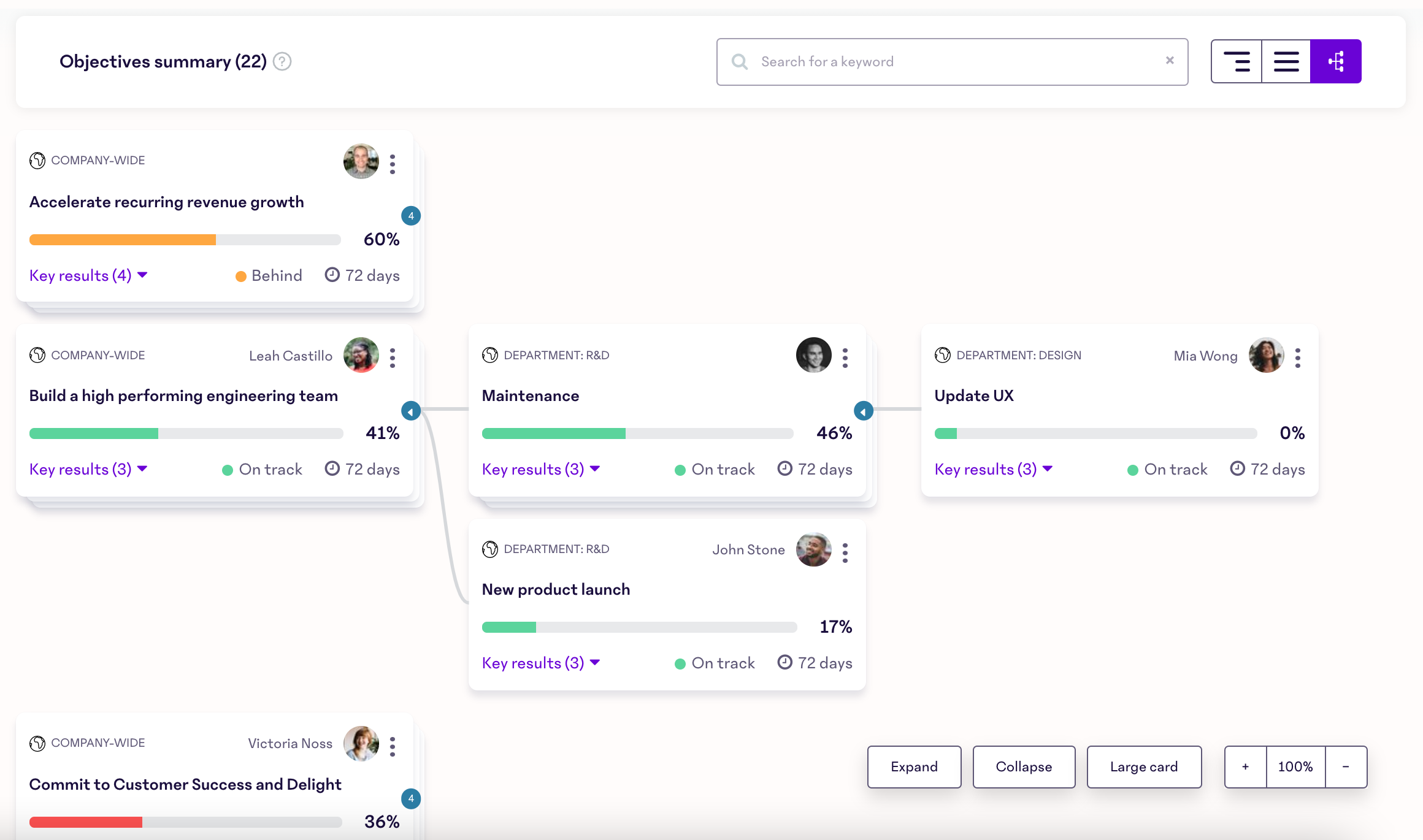10 Best Perdoo Alternatives in 2026: Compare Features & Pricing
.svg)

.svg)

Perdoo is a well-known OKR platform praised for its simplicity and effective goal alignment, but users often find its mobile app having far less functionality than the web version. They also note having experienced bugs such as updates not saving or data getting overwritten. Both of these are just some of the factors that frequently cause frustration due to a fragmented user experience that can also disrupt workflows.
As a result, many teams seek alternatives that better support mobile workflows, offer stronger Microsoft 365 integration, and provide enhanced performance management features. Organizations frequently switch to Perdoo alternatives with more robust mobile apps and seamless integration capabilities.
We'll examine each platform's strengths, pricing, and unique features to help you find the perfect fit. Teamflect leads our recommendations as the best Perdoo alternative for Microsoft 365 users, offering native Teams integration and robust mobile functionality.
While Perdoo is a solid entry point for goal setting, many high-growth teams eventually hit a ceiling with the platform. Transitioning to perdoo alternatives isn't just about finding a new UI; it’s about solving specific operational friction points that hold teams back.
According to research from Gartner, organizations that closely align performance management with employee needs realize a 24% boost in workforce performance. This shift is why organizations are making the switch in 2026:
Perdoo positions itself as a dedicated OKR software that helps organizations align their teams around strategic objectives. The platform offers a visual Strategy Map feature that connects OKRs to overall business strategy, making it easier for teams to understand how their work contributes to company goals.
Key features include:
Pros: "Perdoo is definitely a good choice for organizations looking to bring clarity, alignment and accountability to their strategy execution." - Software Advice Review
Cons: "The platform can feel a bit rigid when trying to update a goal or OKRs and it would be good to be able to collapse the key initiatives under the key results to stop the page becoming too busy to read." - G2 Review
Many organizations find themselves looking for Perdoo alternatives due to several key limitations:

Organizations using Microsoft 365 find Teamflect to be the most natural replacement for Perdoo. Unlike other alternatives that treat Microsoft integration as an afterthought, Teamflect was built specifically for Teams users who need powerful OKR software that works within their existing workflow.
Teams switching from Perdoo to Teamflect gain access to a complete performance management system that includes goal tracking, performance reviews, and employee engagement surveys. The platform's AI agent capabilities help automate routine tasks while maintaining the personal touch that makes performance management effective.
"Feels natural inside Teams, no need for another tool." - Microsoft AppSource Reviews
Pros:
Cons:

Profit.co provides a comprehensive OKR platform that works particularly well for teams using Google Workspace. The platform combines strategy execution with task management and employee engagement features, making it a strong choice for organizations wanting more than basic OKR tracking.
Pros: "It's great and easy to use. I can control every aspect of the business, I can upload things and I can assign tasks to everyone." - Software Advice Review
Cons: "OKR management needs not only the software, it is tied to an organizational culture, and this is hard to connect between the system." - Capterra Review

Quantive Results brings AI-powered strategy management to OKR tracking, making it ideal for large organizations that need sophisticated strategy execution capabilities. The platform combines traditional OKR management with advanced analytics and strategic planning tools.
"This has helped develop standarts throughout various departments and is a crucial piece for our employees to set goals for themselves." - Software Advice Review
Pros:
Cons: "The product is a bit pricey to roll out to the lower levels of the organization." - Gartner Peer Insights

Betterworks specializes in helping large organizations manage performance and goals at scale. The platform provides robust OKR management combined with comprehensive performance tracking capabilities that work well for companies with complex organizational structures.
Pros: "The visibility it provides into goal progress and engagement patterns makes it easier to support teams proactively." - G2 Review
Cons: "There are competitors and other open-source tools that offer a similar set of capabilities for a cheaper cost." - Gartner Peer Insights

Tability focuses on making OKR management straightforward and accessible. The platform prioritizes ease of use over complex features, making it perfect for teams that want effective goal tracking without overwhelming functionality.
Pros: "Tability has helped our team keep on track and achieve our goals on time." - Capterra Review
Cons: "Occasionally, inviting/onboarding new users takes a bit of handholding due to the amount of functionality." - G2 Review

Mooncamp provides OKR management with a focus on European data privacy requirements and business practices. The platform offers strong goal alignment features with particular attention to GDPR compliance and European business needs.
Pros: "There are not many German/European tools out there that can compete on the same level of flexibility, ease of use and feature-richness as Mooncamp does." - Software Advice Review
Cons: "The drop-down menu needs to be improved for large screens. On a large screen, the menu covers the entire screen and is not limited to a small area, which can be distracting." - G2 Review
.webp)
Workpath combines OKR management with strategic planning tools designed specifically for mid-market organizations. The platform provides a balance between enterprise-grade features and the simplicity that growing companies need.
Pros: "It helps a lot to make our goals transparent, to align all the teams, to track progress, identify impediments and achieve our goals." - Capterra Review
Cons: "For us as a relatively small company (<50), workpath is a heavy solution that comes with many features. I'd wish for a "SME solution" that is more comprehensive. " - G2 Review

Weekdone focuses on combining OKR management with structured weekly reporting. The platform is designed for teams that want regular check-ins and progress updates as part of their goal management process.
Pros: "It's a nice tool to keep track of progress of yourself, team, and company and provides useful graphs and overviews." - Capterra Review
Cons: "We integrated Weekdone & Microsoft Teams for 1:1s & other updates but the notifications are not synchronised. Every week we have to delete the cache & re-login Weekdone inside Teams." - G2 Review

Lattice provides comprehensive people management that includes OKR functionality as part of a broader performance management suite. This makes it ideal for HR teams wanting to integrate goal management with other people operations.
Pros: "It makes our review process much easier and alleviates much of the admin burden [associated] with review time." - G2 Review
Cons: "As a smaller company, we sometimes find that certain data is unavailable in drill-downs, limiting the depth of our analysis. - Software Advice Review

15Five combines OKR management with continuous performance management, making it suitable for organizations that want ongoing feedback and check-ins integrated with their goal-setting process.
Pros: "You can define roles clearly for each person, organize one-on-one performance reviews, create objectives and track progress." - Forbes
Cons: "The platform can feel overwhelming with all the different features and check-in requirements." - Gartner Peer Insights
Selecting the best Perdoo alternative requires careful consideration of your team's specific needs and circumstances. Understanding what to look for in performance review software and the types of HRIS systems available will help guide your decision.
Consider both your current team size and anticipated growth over the next 1 to 2 years. Some platforms work better for smaller teams, while others are designed for enterprise scale. Factor in pricing changes as your team grows and whether volume discounts are available.
List your non-negotiable requirements before evaluating alternatives. Do you need comprehensive performance management beyond OKRs? Are mobile capabilities critical for your remote team? Understanding use cases for AI agents in HR can help determine if automated insights and recommendations would benefit your organization.
Compare not just the per-user pricing but the total cost of ownership including implementation, training, and ongoing support. Some platforms offer free tiers that might work for smaller teams, while others require enterprise-level investment.
Evaluate how well each alternative integrates with your existing tech stack. If you're using Microsoft 365, solutions with native Teams integration will provide better user adoption. Consider the performance tracking capabilities you need and how they connect with your current systems.
Making the transition from Perdoo to a new platform requires careful planning to ensure smooth data migration and team adoption.
Start by exporting your existing OKRs, progress data, and historical information from Perdoo. The platform provides export capabilities that allow you to download your data in formats that most alternatives can import. Document your current goal structure and alignment before beginning the migration.
Allow 2 to 4 weeks for a complete transition, depending on your team size and data complexity. Plan the migration during a natural break in your OKR cycle if possible. Communicate the timeline clearly to all stakeholders and build in buffer time for unexpected issues.
Schedule training sessions for your team on the new platform before fully transitioning away from Perdoo. Consider running both systems in parallel for a short period to ensure nothing is lost in the transition. Identify power users who can help train and support other team members.
Perdoo offers helpful OKR features but falls short with limited mobile functionality, complex setup, and higher costs as teams grow. Many switch to alternatives that provide better mobile support, stronger Microsoft 365 integration, and comprehensive performance management.
Teamflect is the top Perdoo alternative for Microsoft 365 users, delivering seamless Teams and Outlook integration, full mobile OKR tracking, performance reviews, engagement surveys, and AI-powered insights. Its intuitive design and free tier make it ideal for boosting alignment and performance within the Microsoft ecosystem.
Perdoo can be worth it for teams that need dedicated OKR management with strategy visualization features. However, many organizations find better value in alternatives that offer broader performance management capabilities, stronger mobile functionality, or better integration with their existing tools.
Teamflect provides the best free alternative to Perdoo, offering full OKR software functionality for up to 10 users with no time restrictions. Unlike other free alternatives with limited features, Teamflect includes performance management, AI agent capabilities, and native Microsoft Teams integration at no cost.
Yes, you can migrate your data from Perdoo to most alternatives. Perdoo provides data export capabilities, and platforms like Teamflect offer migration support to help transfer your OKRs, progress tracking data, and team structure to the new system without losing historical information.
An all-in-one performance management tool for Microsoft Teams
